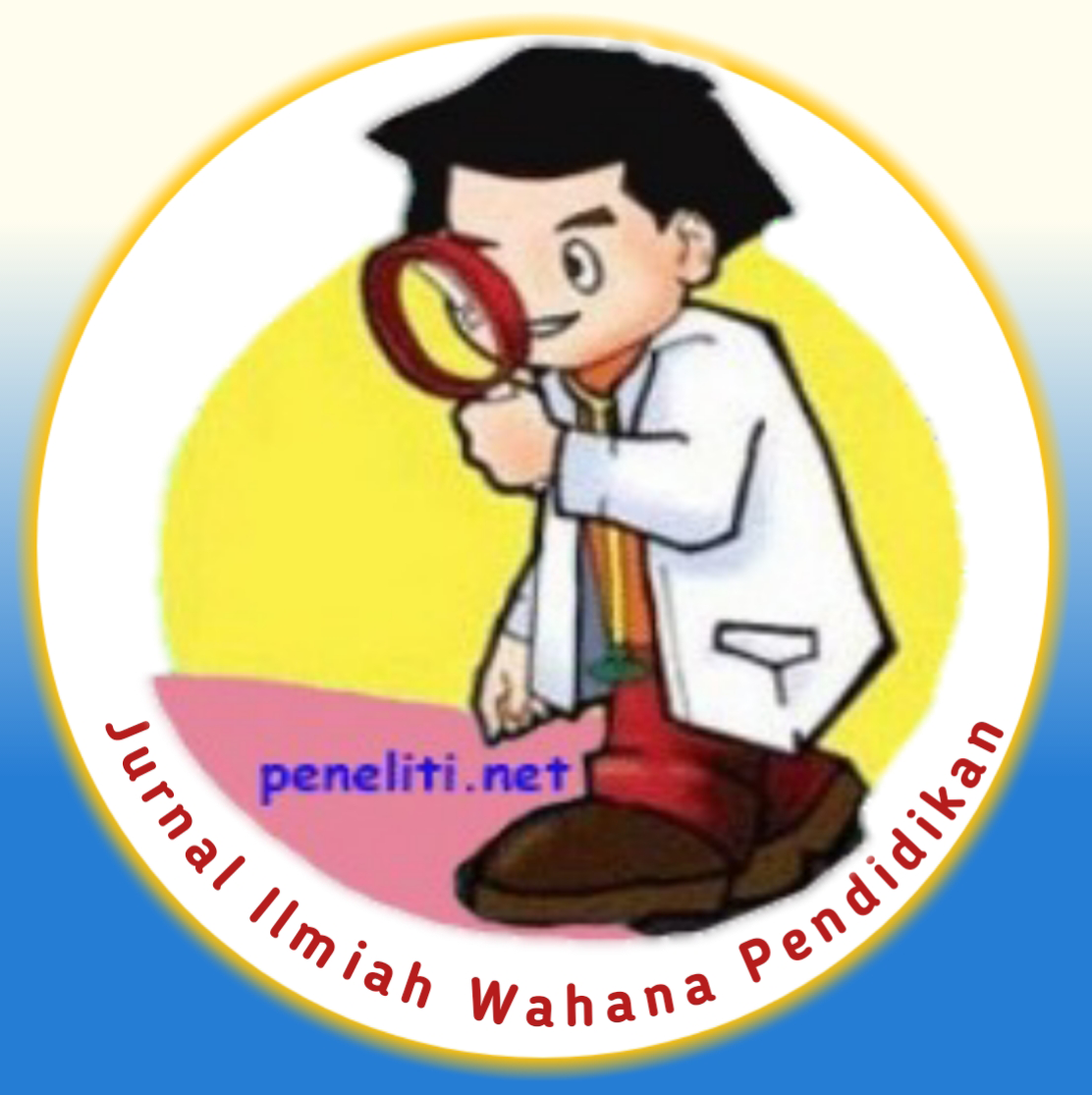Pengaruh Pemberian Layanan Bimbingan Konseling Sekolah Terhadap Perilaku Disiplin Siswa
Abstract
This research was conducted at Christian Middle School 2 Salatiga grades VIII A and B with a total of 60 students and was the total sample. This study aims to determine the significance of the Influence of Providing School Counseling Services on the Discipline Behavior of Class VIII Students at Christian Middle School 2 Salatiga. The measuring tool used in this study is Disciplinary Behavior which is compiled based on Arikunto's theory (2013) and School Counseling Services which is compiled based on Prayitno's theory (2012). The analysis technique used is linear regression which is processed with the help of the SPSS version 26.0 for Windows program. There is a RSquare value: 0.280 indicating the coefficient of determination (R2). This means that the contribution of the BK Service variable to the Disciplinary Behavior variable is 28%, the rest (72%). The regression results obtained from the counseling services variable have a Sig value. 0.000, because sig. 0.000 <0.050, meaning that there is a significant effect of the School Counseling Service on the Disciplinary Behavior of Grade VIII Students at Christian Middle School 2 Salatiga
References
Arikunto, S. 2013. Prosedur Penelitian: Suatu Pendekatan Praktik. Jakarta.
Ernita Br Tarigan, Meningkatkan Kedisiplinan Siswa Dalam Proses Belajar Mengajar Melalui Layanan Konseling Kelompok Pada Siswa Kelas Vii-3 Smp Negeri 1 Gebang Tahun 2017-2018tahun 2011/2012, Jurnal Tabularasa Pps Unimed. Vol 15:3;
Hilmi Mubarok Putra, Deka Setiawan, Nur Fajrie, Perilaku Kedisiplinan Siswa Dilihat Dari Etika Belajar Di Dalam Kelas, Jurnal Prakarsa Paedagogia. Vol 3:1;
H.Prayitno, Amti, Erman. 2013. Dasar-Dasar Bimbingan dan Konseling. Jakarta: Rineka http://bimbingankonseling-id.blogspot.com/2018/01/pengertian-bimbingan-konseling-secara-umum-dan-para-ahli.html diakses 22 april 2021, waktu 12:00WIB.
Najmy Hanifah, Eni Fahyuni, Eksistensi Layanan Bimbingan Konseling di Masa Pandemi COVID-19, Jurnal counsellia, Vol 11:2;
Prayitno. 2012. Jenis Layanan dan Kegiatan Pendukung Konseling. Padang: FIP UNP Psikologi Perkembangan. Jakarta: Kencana.
Soesilo, T. D. (2018). Penelitian Inferensial dalam bidang pendidikan. Salatiga: Satyawacana University Press.
Sugiyono. 2014. Metode Penelitian Kuantitatif, Kualitatif, dan Kombinasi (Mixed Methods). Sutopo, editor. Bandung: Alfabeta.
Sugiyono.2011.Metode Penelitian Administratif: Bandung:Alfabeta
Keffer, A., Wood, D., Carr, S., Mattison, L., & Lanier, B. (1998). Ownership and the well-planned study. In B. S. Bisplinghoff & J. Allen (Eds.), Engaging teachers: Creating teaching/researching relationships (pp. 27-34). Portsmouth, NH: Heinemann.
Kim, M. K., Xie, K., & Cheng, S. L. (2017). Building teacher competency for digital content evaluation. Teaching and Teacher Education, 66, 309-324. https://doi.org/10.1016/j.tate.2017.05.006
Leonard. (2018). Task and forced instructional strategy: Instructional strategy based on character and culture of Indonesia nation. Formatif: Jurnal Ilmiah Pendidikan MIPA, 8(1), 51–56. http://dx.doi.org/10.30998/formatif.v8il.2408
Marti, A. D. (2012). Pendidikan inklusif di sekolah dasar Kota Padang. Jurnal Penelitian Pendidikan Khusus, 1(3).
Marzano, R. J. (2003). What works in schools: Translating research into action? Alexandria, Virginia: Association for Supervision and Curriculum Development.
Musfah. (2012). Peningkatan Kompetensi Guru. Jakarta: Kencana.
Nasongkhla, J. & Sujiva, S. (2015). Teacher competency development: Teaching with tablet technology through Classroom Innovative Action Research (CIAR) coaching process. Procedia Social and Behavioral Sciences, 174, 992-999. https://doi.org/10.1016/j.sbspro.2015.01.723
Nousiainen, T., Kangas, M., Rikala, J., & Vesisenaho, M. (2018). Teacher competencies in game-based pedagogy. Teaching and Teacher Education, 74. 85-97. https://doi.org/10.1016/j.tate.2018.04.012
Peiris, S. (2013). Environmental education program goals and growth: The role of funding, administrative capacity, target population, and program structure. Waste Management Education Programs, Spring, 1-13. Retrieved from: https://nature.berkeley.edu/classes/es196/projects/2013final/PeirisS_2013.pdf
Richey, R.C. & Nelson, W.A. (2000). Handbook of Research for Educational Communication and Technology. New York: Macmillan Library.
Ritchie, J. S., & Wilson, D. E. (2000). Teacher narrative as critical inquiry: Rewriting the script. New York: Teachers College Press.
Rust, F., & Meyers, E. (2003). Introduction. In E. Meyers & F. Rust (Eds.), Taking action with teacher research (pp. 1-16). Portsmouth, NH: Heinemann.
Samsudin, M. (2016). Pengembangan Model Desain Program Pelatihan Manajemen dan Kepemimpinan Pimpinan Perguruan Tinggi Muhammadiyah. Unpublished Disertation. Jakarta State University.
Senese, J. C. (2001). The action research laboratory as a vehicle for school change. In G. Burnaford, J. Fischer, & D. Hobson (Eds.), Teachers doing research: The power of action through inquiry (pp. 307-325). Mahwah, NJ: Lawrence Erlbaum Associates.
Silander, T. (2013). Pedagogical environments – Case Finland. Formazione & Insegnamento, 11(4), 51–62. http://doi.org/10746/-fei-XI-03-13_02
Suryani, C. (2015). Implementasi supervisi pendidikan dalam meningkatkan proses pembelajaran di MIN Sukadamai Kota Banda Aceh. Jurnal Ilmiah Didaktika: Media Ilmiah Pendidikan dan Pengajaran, 16(1), 23-42.
Talaia, M., Pisoni, A., & Onetti, A. (2016). Factors influencing the fund-raising process for innovative new ventures: an empirical study. Journal of Small Business and Enterprise Development, 23(2), 363-378.
Tandberg, D. (2010). Interest groups and governmental institutions: The politics of state funding of public higher education. Educational Policy, 24(5), 735-778.
Varghese, C., Vernon-Feagans, L., & Bratsch-Hines, M. (2019). Associations between teacher-child relationships, children’s literacy achievement, and social competencies for struggling and non-struggling readers in early elementary school. Early Childhood Research Quarterly, 47, 124-133. https://doi.org/10.1016/j.ecresq.2018.09.005
Verner, I., Massarwe, K., & Bshouty, D. (2019). Development of competencies for teaching geometry through an ethnomathematical approach. Journal of Mathematical Behavior, 56, 100708. https://doi.org/10.1016/j.jmathb.2019.05.002
Walberg, H. J. (2006). Improving educational productivity: An assessment of extant research. In R. F Subotnik & H. J. Walberg (Eds.), The scientific basis of educational productivity (pp. 103–160). Greenwich, Co: IAP
Wells, G. (2001). The development of a community of inquirers. In G. Wells (Ed.), Action, talk, & text: Learning and teaching through inquiry (pp. 1-22). New York: Teachers College Press.
Zeichner, K. (2003). Teacher research as professional development for P-12 educators in the USA. Educational Action Research, 11(2), h. 301-326.




